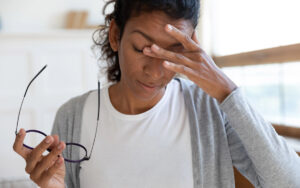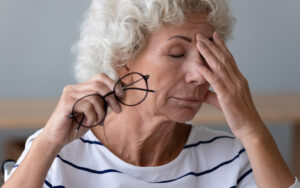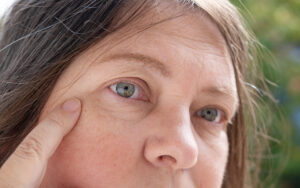Best Ways to Protect the Eyes in Winter

If you are the type that loves to look out the window to see the pavements and sidewalks powdered all white with snow, you are probably excited for winter. It is the season when you gear up with sleds, skates, and snowboards to enjoy all that snow-covered winter has to offer.
However, there is a danger to staring at the dazzling snow and going on winter activities without adequate eye protection. Snow glare and dry air can affect your eyes and cause various conditions if you do not protect them well.
Being careless with eye care during the winter can prove problematic if you are already dealing with dry eyes or eye irritation. This article will highlight ways you can protect your eyes during the winter. But first, do you know anything about dry eyes? If not, here’s what you need to know.
What are Dry Eyes?
What causes dry eyes during the winter? Dry eyes develop because of the increased heat sources around the house and the lack of moisture in the air.
These two things can cause your eyes to become itchy and dry. During winter, many people increase heat sources around the home through lit fireplaces and artificial heaters. The increased heat dries the air, making you more susceptible to dry eyes.
Developing dry eyes during the winter will sometimes cause swelling, pain, and blurred vision as the eyes dehydrate.
How do you deal with dry eyes?
You can handle this problem in many ways, but the most common is to regulate your indoor temperatures. Setting your central heating system on mild is one of the best ways to ensure your eyes have ample moisture retention. If you are still cold, consider adding layers.
Another thing you can do is blink more. Do not allow your blinking to slow down when engaging in activities that require dedicated visual attention, such as watching videos on your phone. Blinking more will ensure you produce enough tears to act as sufficient lubrication.
So, now that you know about dry eyes and how to deal with them let us look at the other ways you can protect your eyes during the winter.
Hydration
When winter rolls in, your eyes might start getting dry because of a lack of enough moisture, as mentioned above. You can use a humidifier or artificial tears to ensure your eyes get enough hydration.
You can also set a moderate temperature level on your HVAC system in the house or keep a distance from direct heat sources.
And while you may not be thirsty during the winter, drinking as much water as possible is good to help keep your membranes moist. Drinking tea and hot cocoa is good but ensure you drink water too. Experts suggest drinking about 8-10 glasses per day.
Quality Sunglasses
Most people do not know that ultraviolet (UV) rays can still make their way through the clouds during the winter. Many think their eyes are safe because the sun is covered, but this is false. Just because you cannot see the sun does not mean it is not there emitting harmful UV rays.
In fact, the UV rays being emitted during the winter can sometimes be more harmful than in summer. It is because the snow cover reflects ultraviolet rays, making them more damaging to the eye.
So, ensure you have a pair of quality sunglasses with you at all times, even in the winter. Your sunglasses should be able to block UV rays, so a generic pair will not do.
Eye Hygiene
Before going to bed, ensure you wash your face and eyes thoroughly. Germs, make-up residue, and sweat can negatively affect the eyes if not removed daily. If you put on make-up, avoid sharing make-up brushes because this can spread bacterial or viral infections, affecting the eyes and making you ill.
Most people usually brush this off, but you would be surprised how easy it is to neglect your eye hygiene during all the fun holiday festivities of winter. So start and maintain an eye hygiene routine. Also, try not to touch your eyes too much, especially if you have dry eye symptoms.
Manage Screen Time
Dry eye symptoms during winter worsen when you are on the screen too long. So, take regular breaks when using a tablet, computer, TV, or phone. You naturally blink less when looking at screens, meaning your eyeballs will produce fewer tears.
A good rule to observe is to look away from your screen every 20-30 minutes. During these pauses or breaks, take 20 seconds to look at something at least 20 feet away to encourage blinking.
It is easy to forget these pauses or breaks when you are focused on work, reading, or watching videos on a screen, so setting a timer is an excellent idea to help you remember.
Regulate your Diet
The elements that constitute your visual functions, eyes included are designed to work as a cohesive unit. And diet is a big part that ensures everything runs properly. So, if you want your visual functions to have seamless performance, you must regulate your diet.
Eating cold-water fish is a proven way of improving visual function through diet. These fish are loaded with healthy omega-3 fatty acids. These fatty acids are known to help retain moisture in the eyes.
Regularly eating cold-water fish will provide your eyes with much-needed lubrication to help keep dehydration at bay during the winter. Some popular fish options include halibut, tuna, and mackerel.
Takeaway
Winter is great, and for some people, there is nothing that comes close to its splendor. However, winter also comes with indoor heat, colder winds, and lower humidity. This combination can result in conditions that negatively affect the eyes. Eye problems will then ruin the whole season for you.
So if you do not want this to happen, you must take good care of your eyes. Hopefully, this article has provided helpful insight on ways to ensure your eyes stay healthy throughout the winter holidays. Don’t let dry eyes stop you from having the best winter holiday.




